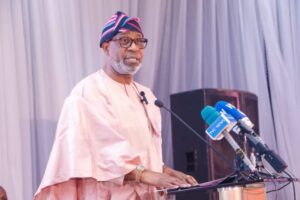
Recapitalisation: Access Bank confident of raising $300m – Aig-Imoukhuede
Mr Aigboje Aig-Imokhuede, Chairman of Access Holdings Plc, says he’s confident that the bank would raise 300 million dollars in capital for Access Bank, considering the bank’s strong market position and shareholders’ support.
Aig-Imokhuede said this in an interview with the News Agency of Nigeria(NAN) on the sideline of Access Holdings’ second Annual General Meeting(AGM) held in Lagos.
NAN reports that the Central Bank of Nigeria (CBN), on March 29, directed commercial banks in Nigeria with international authorisation to shore up their capital base to N500 billion and national banks to N200 billion.
Similarly, non-interest banks with national and regional authorisation will increase their capital to N20 billion and N10 billion, respectively.
The recapitalisation exercise is expected to commence from April 1, to March 31, 2026.
Consequently, the shareholders of Access Bank, iat the AGM, unanimously backed the Group’s plan to establish a capital raising programme of up to $1.5 billion.
They also agreed to the subset initiative to raise up to N365 billion specifically, through a Rights Issue of ordinary shares to its shareholders.
The proceeds of the rights issue will be used to support ongoing working capital needs, including organic growth funding for the group’s banking and other non-banking subsidiaries
Aig-Imokhuede explained that having announced to embark on a capital raising through Right Issue, he was confident that the group’s shareholders would support the bank in the journey.
He stated that Access Holdings had p0a unique relationship with the capital market in Nigeria and internationally.
“It is not the first time CBN is coming up with such policy.
“Recall that in 2004 when CBN announced that all banks must recapitalise to the tune of N25 billion and Access Bank had about N3 billion of capital.
“Between 2004 and 2007, our team, when I was the CEO of the bank, raised two billion dollars of common equity capital.
“Therefore, in 2024 when Access Holdings is much older, wiser, stronger, larger and significantly respected by the capital market with over 800,000 shareholders, raising 300 million dollars in capital for Access Bank, its banking subsidiary is not really much of a challenge.
“We signalled to the market first that we will be doing a Right Issue, which means that we must carry everybody along, in spite of our large institutional shareholders.
“Nonetheless, we believe in ensuring that shareholders, either large or small, continue with us on our journey.
“They have always supported us when need be with good reasons, because they believe in the company and the performance that would be delivered subsequently to such capital raising exercise.
“What is on the mind of our shareholders now is recapitalisation and they are also concerned about how their company continues to deliver returns,” he said.
Commenting on the CBN recapilisation policy, the chairman noted that Access Bank as a group endorses the CBN policy wholeheartedly.
Aig-Imokhuede described the policy as a good and sensible prudential regulation.
He added that banks, particularly after period of significant devaluation of domestic currency, volatility in the foreign exchange, and interest rate regime, are always encouraged to build up their capital buffer.
According to him, this is to ensure that whatever adverse effect that may arise as a result of the dynamic changes in the business environment would not affect their very concern.
In terms of performance and expectations from Access Holdings going forward, Aig-Imokhuede stated that the earning profile of the group, which spread across Nigeria, Africa and outside Africa subsidiaries, is very robust.
He said: “As an investor, you always look to see whether there is deep concentration where the profit is coming from; in our case, these arears are spread across three core areas that is of significant interest to local and international investors.
“If you look at the performance of banks in the year ended 2023 financial reports, you will see that all banks in naira terms have increased significantly their profitability as a result of the devaluation.
“But that isn’t the case with Access Bank, whose revaluation benefits come from the fact that it has significant international operations, because it is not a function of holding large foreign currency balances.
According to him, Access Bank, United Kingdom for example, is the largest and probably highest performing Sub-saharan African bank that has a license in the UK and making hundred of millions of naira of profit from the UK.
The chairman further said that this is not an accounting benefit that comes in the year 2023, but will continue, and with the operations of the bank in France, and across other European, Asia and Middle Eastern jurisdiction.
“We can see that the foreign currency benefit of profit in those locations are going to also accrued to the holding.
“The holding as an investor is also thinking of retail banking, which is like a utility. A retail banking with about 60 million customers is enough to sustain the bank anytime, irrespective of how volatile or uncertain the market is,” he said.
Access Holdings full-year results for the period ended Dec. 31, 2023, showcased an impressive 335 per cent increase in pre-tax profit to N729 billion from N167.68 billion in 2022.
The group also experienced an 87 per cent surge in gross earnings to N2.59 trillion from N1.39 trillion in 2022 and reported a remarkable 306 per cent growth in profit After Tax to N619.32 billion, from N152.20 billion posted in year 2022.




